Recent Korean productions have triumphantly injected new life into the tired zombie genre. In 2019, we got Kingdom, a zombie apocalypse series set in the early Korean dynasty era. Then, at the beginning of 2022, we were treated to the coming-of-age zombie series, All of Us Are Dead. And of course, who could forget the one that started the Korean zombie wave --- 2016's Train to Busan.
Never would we have guessed how exciting a zombie story could be in historical dynasties with a good dose of kingdom politics. Or with a school drama of awkward adolescent angst and romances. They weren't perfect shows, but they were undeniably enjoyable.
Korea once again tries to couple the zombie formula with something else. It worked splendidly so far, so why not do it again? 😋
All images are from stills released by tvN network for Happiness 2021 press release.
Happiness: The New Netflix Zombie Series
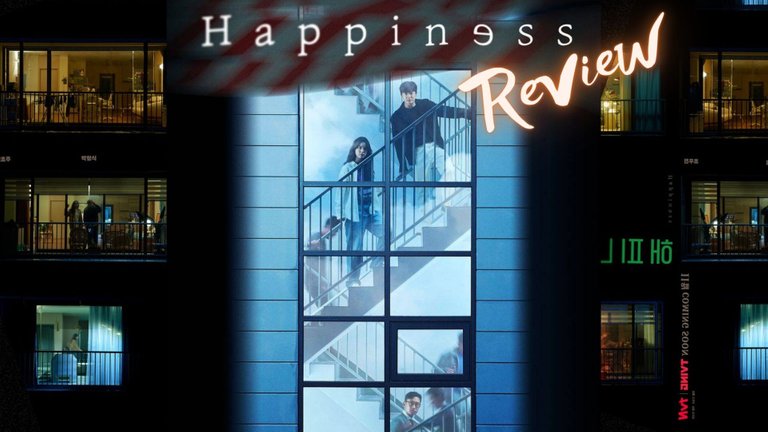
Happiness originally aired in Korea in late 2021. Now, Netflix brings the series to homes worldwide as one of its April 2022 new lineup. Its brief Netflix teaser reads:
Residents of a high-rise building fight for survival when a deadly disease breaks out and turns the infected into blood-lusting zombies.
The plot sounds awfully similar to the Korean zombie movie Alive or the other non-zombie apocalypse series, Sweet Home. Both were released on Netflix in 2020, and both feature the cast isolated in an apartment with monsters lurking.
While it's true that Happiness rehashes the trapped-with-monsters element and so many other zombie tropes, it packages them into a unique experience. It exhibits the same re-invention magic as the aforementioned Korean zombie productions above.
If you are still somewhat hesitant to binge-watching the new Netflix series, read on for my impressions. I'll talk about the five things that I loved about the show. Warning! It will contain spoilers. I'll try to be vague about specific plot points and focus on talking about only the first few episodes, but spoilers are spoilers. Proceed at your own risk.
1) A Zombie Outbreak That's Really Not a Zombie Outbreak
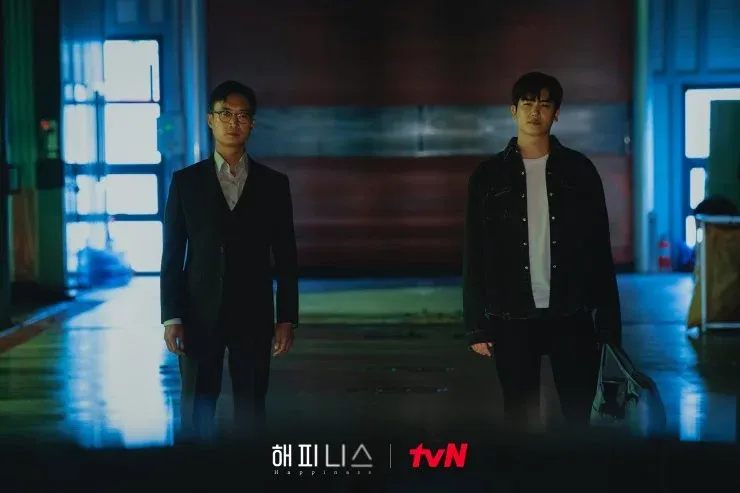
I consider this not too spoiler-y since it's revealed immediately within the first half of the first episode: the zombies aren't really zombies. By popular definition, zombies are reanimated corpses having an insatiable hunger for living flesh. But Happiness-zombies only got it half right.
They have the compulsion to feast on the living, specifically a thirst for warm blood. But the zombies from the show aren't really dead. The zombie-ness ebbs, so the ones infected revert to regular people. They even spend most of their time being normal rather than being blood-feeders. The urge to feed surfaces more frequently and tenaciously as the infected give in to their thirst. Amusingly, even satiating their thirst with regular water only heightens their desire for blood.
This element forces an interesting dilemma in the series. Should human dignity and natural rights be preserved despite the infected becoming occasional monsters? It's easy when it's the standard apocalypse. People just go hack and slash at anyone who looks at them. But Happiness doesn't get to the same level of desperation and terror. It feels less terrifying but much more authentic and closer to our present time ... And that might make your skin crawl much more.
2) The Covid-Contemporary Relevance
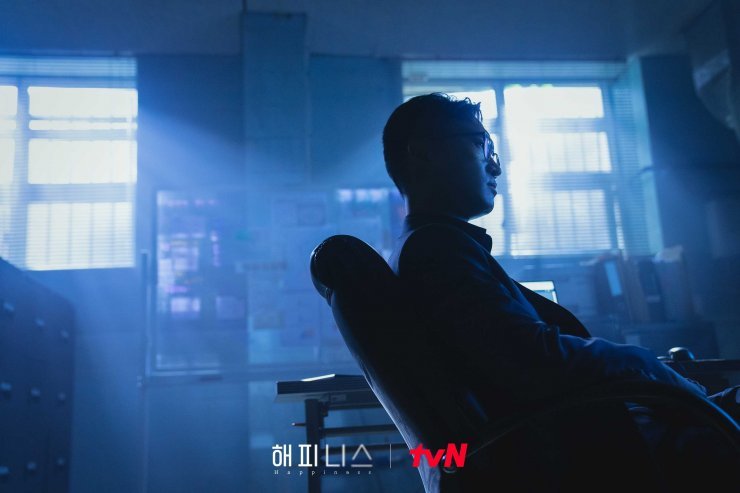
Happiness feels very current. Aside from having a zombie infection that feels much closer to reality, there's one other modern truth prevalent in the series --- the fact that we had a COVID-19 pandemic.
At the first mention of Covid in one of the early episodes, I honestly cringed. I assumed it was a haphazard attempt to be relevant and trendy. I thought it was only a shallow hook to pique the audience's interest and build a random connection.
But I was wrong. The ongoing real-world Covid story has sunk deep into the fictional story. I wager that the show's creator was majorly inspired by our collective COVID-19 experience and came up with the script. Happiness tackles the hardship of being kept quarantined and distanced from loved ones. It also mirrors the fear of connecting with people because of the infection, especially since, similarly to Covid, the zombies appear normal despite being carriers of the disease.
Within the story, the Covid relevance manifests in many meaningful ways too. In the prospect of prolonged quarantines, the characters know what's needed to get done. Despite the fears of zombie infection, they can happily spend the day away isolated with family or friends. Covid prepared them for this.
And it's just not the regular people-cast; even the characters tied to the government are much more Covid-savvy. The ones infected are quarantined in facilities that you'll immediately think were initially used for Covid. The Korean government is also incredibly efficient at locking down places and filtering people going in and out of cities. In the back of my mind, this makes me hope that the world would be better prepared if a zombie apocalypse does happen 😅.
3) The Apartment Complex Setting
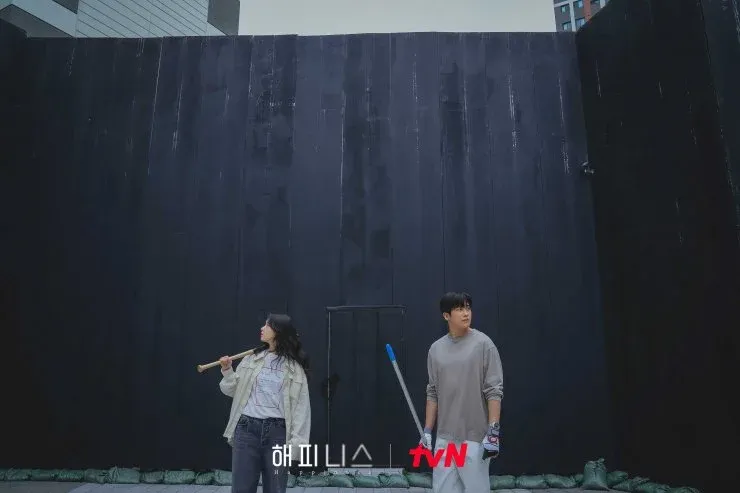
The characters are trapped within the newly established apartment complex. The place is one of potential ground zero for the outbreak. Thus, all its residents are locked up inside, together with an unknown number of infected. The story uses the setting sufficiently well on so many different levels.
My favorite use of the setting is the showstopper in the episode three ender. Vague spoilers, but I have to highlight the epic scene where the main cast is getting quarantined inside the complex. It also ties in with my #2 point about how efficiently the Korean government operates. It's just plain awesome and unnerving! 💪
The setting aids in both social and thriller aspects of the show, too. The cast reside in their own spaces privy to them, so the hidden events unfolding in those locations make the show more suspenseful. What's the constant banging in the apartment above implying? Or whose blood-soaked cloth was found on the staircase between the 3rd and 4th floors?
The apartment building setup also introduces a social commentary on people's wealth and status. The lower floors were subsidized to select people, while the upper ones were bought by the wealthy. The impending zombie apocalypse is a great equalizer, but the social divide still manages to pop up interestingly from time to time.
4) A Character-Focused Story Through and Through
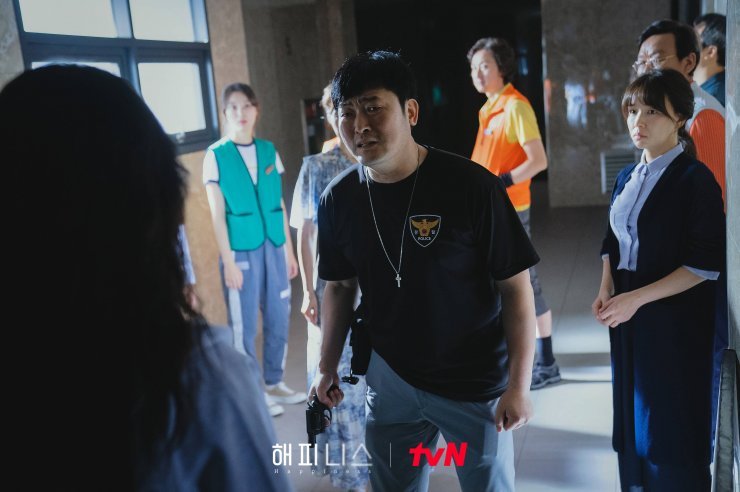
One crucial aspect that Korean zombie and non-zombie shows constantly deliver on is the characters. Probably, not all Korean shows, but the ones I've seen on Netflix, and in movie theaters have excellent character developments. Happiness succeeds on this front, too.
When watching zombie shows, expect several characters to get snuffed. Korean productions more so, since they have built a reputation in recent years of killing off even the main protagonists. Happiness was successful enough to make me care about what happens to each character and what actions they would take. So the threat of the demise of these characters had an impact. Even with the characters I despised, I found them gripping. I didn't wish them a happy ending, but I cared enough to see how their retribution would unravel.
I intentionally kept character descriptions away from this review because it's too much of a spoiler. But I'd like to say they are all universally great. Special kudos to the main lead, Yoon Sae-bom played by the beautiful Han Hyo-joo. She's decisive, impulsive, and hot-headed. A capable SWAT elite that's a ticking time bomb but bound by a genuine righteous and charitable nature. She's a great character type that's unusual to zombie shows.
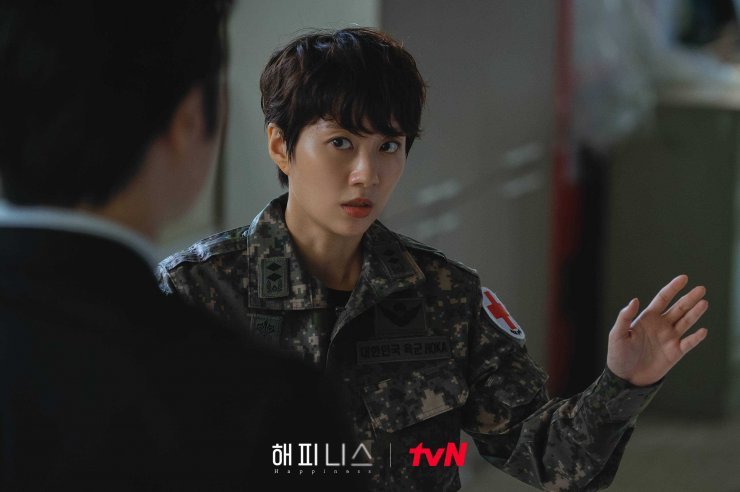
But my favorite would be the tsundere Lietennant Ji-soo, the lady pictured above. I really like her character and arc. The rapport established with Sae-bom in the first episode was gold; and it culminated in a very satisfying moment in the finale.
5) Most Positive Zombie Show I've Ever Seen
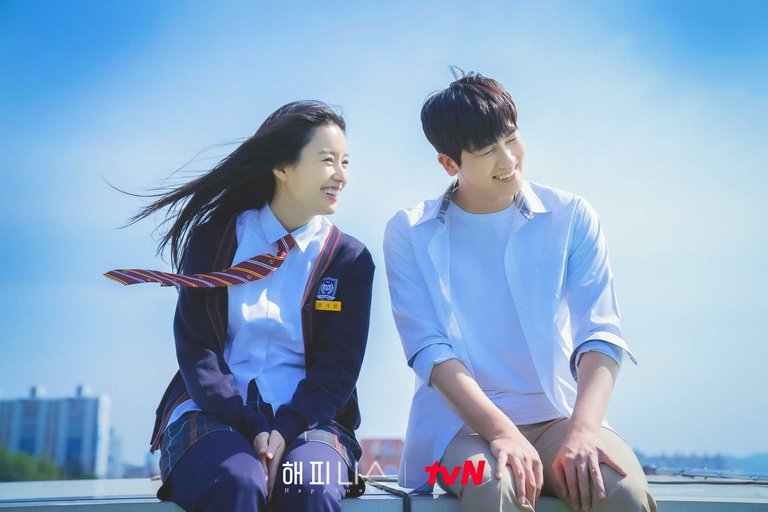
Violence, tragedies, and scares are staples for zombie stories and Happiness has those too. But the show sets itself apart by not reveling in those elements.
There's violence and some gore, but it has never been the focus. The violence actually felt non-essential to the story's development. There are several tragedies and the show acknowledges them, but it never seemed like an unnecessary drama. The character's reaction to those tragic moments felt authentic and normal. I would expect full-blown dramatic moments for a zombie series, but the show uses it sparingly.
In some ways, it fails as a horror show, because it wasn't extremely scary or nerve-racking. It is suspenseful and there's real tension in not knowing what happens to the characters. But the nature of the infection mutes the gnawing uncertainty a lot. It very rarely uses jump scares too; I only remember one moment where I slightly jumped from my seat from surprise.
Perhaps that's why it's titled as such? After watching all twelve episodes, I'm still left wondering if there could have been a more appropriate title for the series. Happiness feels arbitrary. But if I'd make a guess about the title concept, I think it connects to how optimistic the show can be. Its positivity is very out of place in the genre, but it doesn't diminish whatever elements fans love about a zombie show.
Happiness it's at times dark and tragic, but it never forgets its humanity and hopefulness. I think fans of the genre would love it for its uniqueness. But it's also a good entry point for audiences who aren't that fond of horror themes. It's a good middle-ground for showcasing the best of what a zombie story has to offer, but still remaining light and happy at the end of it all. 🙂
Want to create custom images for your blogs? Get creative with Canva.
Attributions:
----------
Happiness images are stills released by tvN network for the show's 2021 release. Header image created with Canva.